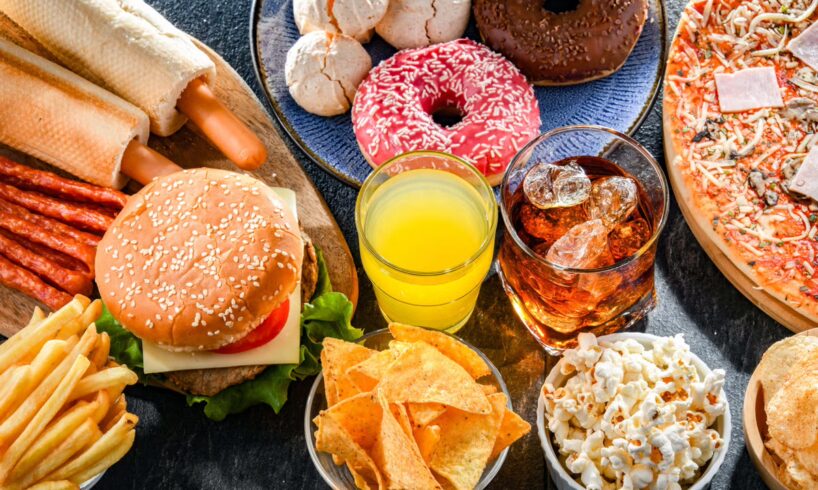
Sign up for our free Health Check email to receive exclusive analysis on the week in health
Get our free Health Check email
Get our free Health Check email
A health expert has warned of how ultra-processed foods (UPFs) could be harming health as one in five Britons revealed they eat them every day without realising.
UPFs include foods that have gone through several steps of processing and include artificial additives, sugar and salt. The most common examples are breakfast cereals, ready meals, fizzy drinks and packaged snacks like crisps or sweets.
Steve Bennett, a qualified health coach who has advised the House of Lords’ food, diet, and obesity committee, explained: “Ultra-processed foods are industrially manufactured products made with additives you’d never use in a home kitchen, things like emulsifiers, stabilisers and artificial flavourings. They’re designed for shelf life and profit, not nutrition.”
open image in gallery
UPFs include foods that have gone through several steps of processing and include artificial additives, sugar and salt (Alamy/PA)
UPFs often contain a lot of sugar, Mr Bennett highlighted as part of Sugar Awareness Week from 17 to 23 November.
He cautioned: “The real danger with sugar is that its effects build up silently over time. Your body compensates by producing more insulin, often for years, before the early signs of metabolic dysfunction start to appear.”
Metabolic syndrome is common and linked to insulin resistance, according to the NHS, and can raise the risk of developing type 2 diabetes or cardiovascular problems. Early warning signs include fatigue, mood swings, and energy crashes, which may indicate blood sugar imbalance.
As a new survey of 500 people by Saga Health Insurance in September revealed one in 16 Britons are unaware of what an UPF even is, Mr Bennett warned of the foods which people may not realise could be harming their health.
open image in gallery
The most common examples of UPFs are breakfast cereals, ready meals, fizzy drinks and packaged snacks like crisps or sweets (Getty Images)
Breakfast cereals
Most breakfast cereals contain at least two to four teaspoons of sugar per 40g serving, with the worst offenders packing in nearly four teaspoons before milk or fruit.
But the real danger, Mr Bennett said, is in “healthy” food imposters where fibre has been removed.
“Even ‘wholegrain’ breakfast cereals can be ‘sugar bombs’ containing more sugar than biscuits after processing strips away protective fibre,” he warned.
Ready meals
Ready meals, which usually come frozen or chilled, have usually been partly or completely cooked and only need to be heated in a microwave or oven before they are ready to eat.
He called the pre-packaged meals “chemical cocktails” and told people to watch out for any type of sugar in the first three ingredients ending in ‘-ose’, such as glucose and fructose or syrup. He added emulsifiers such as polysorbates and anything beginning with ‘E’ followed by numbers is a warning sign.
Mr Bennett, founder of the Health Results website, said: “Food manufacturers understand how sugar affects the brain. When you strip out fibre and add sugar, you create foods that the body struggles to regulate. It’s not accidental, these products are designed to keep you coming back for more.”
open image in gallery
Mr Bennett warned to watch out for any type of sugar in the first three ingredients ending in ‘-ose’ (Getty Images)
‘Low-fat’ products
Mr Bennett warned people to be careful of “deceptive” food labels such as “natural”, “low-fat” or “source of fibre” and avoid products with long ingredient lists.
It can be difficult to spot UPF products which are confusingly marketed as “healthy”, with one in 20 (five per cent) of Britons even mistaking fresh fruit and vegetables for UPFs, showing just how blurred the lines have become.
“Protein bars are often just sweets with added protein powder, and low-fat yoghurts are usually loaded with sugar once the fat is removed,” Mr Bennett warned.
While most people (79 per cent) recognised ready meals as ultra-processed, fewer than a third (31 per cent) realised low-fat yoghurts fall into this category. Less than half identified protein bars (55 per cent) or supermarket salads (44 per cent) as UPFs, despite nutritionists classifying them as such.
Supermarket bread
Mr Bennett, author of The Fibre First Diet, said: “Even modern supermarket bread is highly processed, stripped of the fibre that once made it nutritious.
“One of the biggest issues is that fibre is systematically stripped out during processing. Fibre is nature’s brake pedal – it slows sugar absorption and protects the gut. Without it, sugar floods into the bloodstream at speed.”
Insulin sensitivity and gut diversity naturally decline with age, which makes older adults the most at risk of falling for UPFs.
“That means their bodies can’t manage blood sugar spikes as effectively,” Mr Bennett added. “Add in pre-existing conditions like diabetes or heart disease, and a UPF-heavy diet acts like fuel on the fire.”





